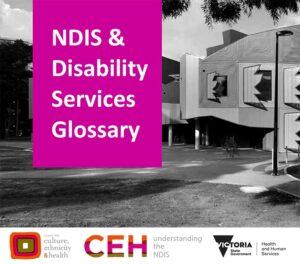Do you use Health Translations when preparing for assignments? The website, funded by the Victorian Government and managed by the Centre for Culture, Ethnicity and Health (CEH), is an online library of more than 20,000 multilingual resources in 107 languages (including Auslan, Easy English and Plain English) related to health and community services.
It is targeted at health professionals, the community sector and language services.
The information and multilingual resources on the Health Translations directory come from websites published by government departments, peak health bodies, hospitals and community health and welfare organisations. This ensures their accuracy and reliability. The Centre for Culture, Ethnicity & Health (CEH) regularly reviews them for quality and relevance. Resources which have been reviewed within the last three years are marked with a green tick 

Say for instance that you are preparing for an interpreting assignment with a National Disability Insurance Scheme (NDIS) participant. The transition of disability services to the NDIS brings with it a whole new language and terminology, with terms that you may not have needed to use previously in your work. This is particularly the case with Auslan, where sign language may need to be created around those new terms, but it can also be a challenge in spoken languages.
Let’s take the example of a Mandarin interpreter looking for information about the NDIS. By entering ‘NDIS’ as a key word and ‘Chinese’ as a language, you have access to 42 resources from all over Australia. You will find information produced by the National Disability Insurance Agency, but also a Glossary of NDIS Terminology developed by CEH and translated in Mandarin and a Helpful Words document from Ethnic Community Services Cooperative in New South Wales.
Amparo Advocacy Inc in Queensland has developed a series of videos about the NDIS in languages where literacy may be an issue, such as Dinka or Chin. You will also find them on Health Translations, as the site hosts videos and audio material as well as written information.
So next time you are looking for information to build up your knowledge and terminology before an assignment, check Health Translations for up-to-date resources in your language.
This above video from Culture, Ethnicity and Heath shows different ways you can search the directory to find information.

Author Biography
Sophie Dutertre is Senior Project Officer for the
